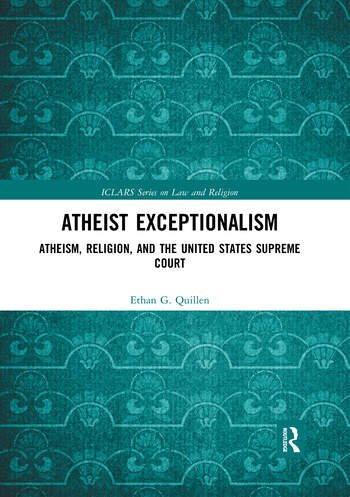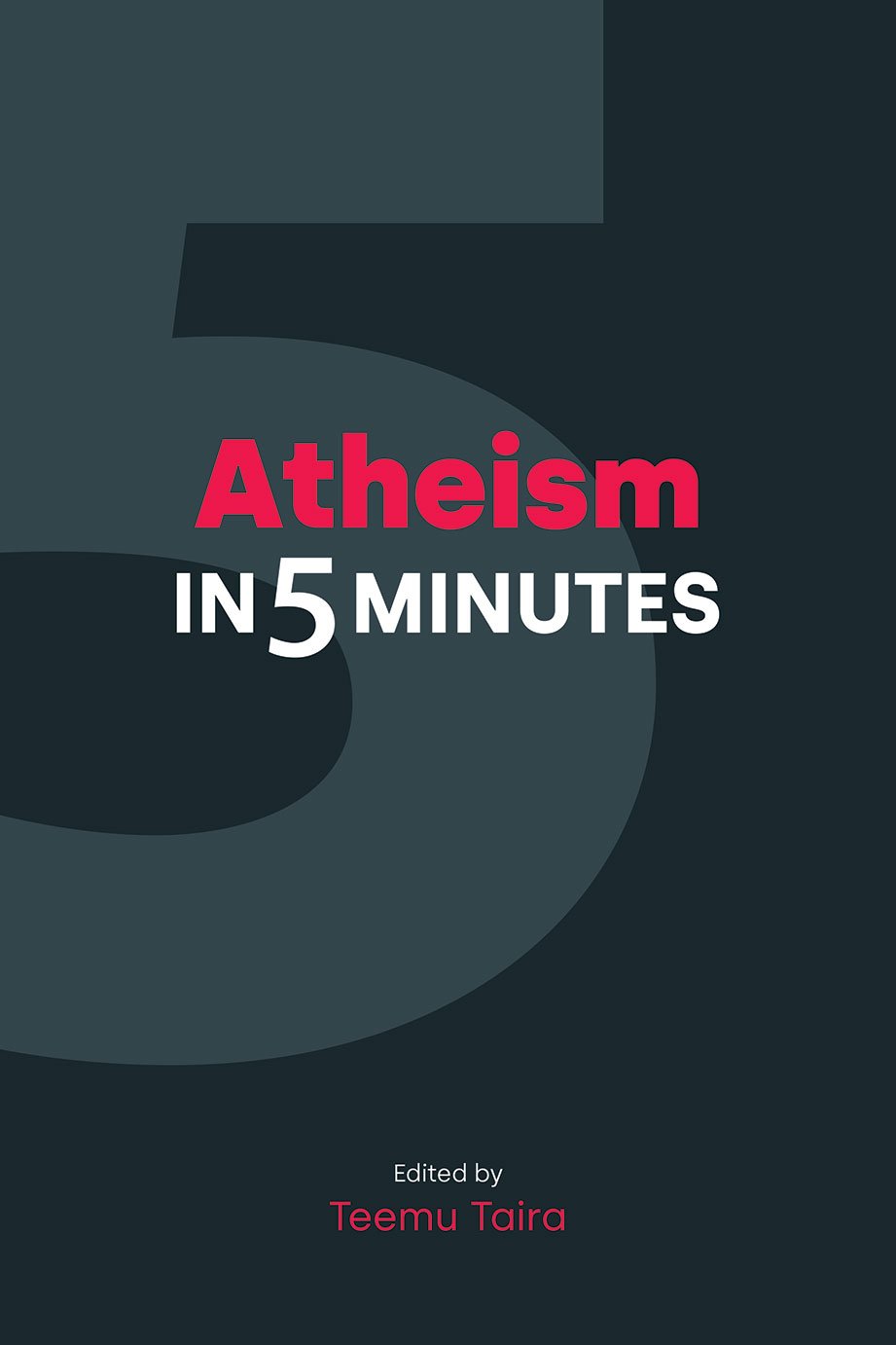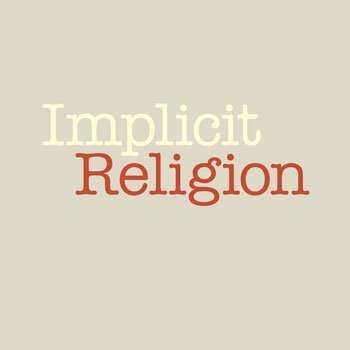When I’m not playing with clay, I write about Atheism.
-

Atheist Exceptionalism.
Due to its Constitution, and particularly to that Constitution’s First Amendment, the relationship between religion and politics in the United States is rather unusual. This is especially the case concerning the manner with which religious terminology is defined via the discourse adopted by the United States Supreme Court, and the larger American judicial system. Focusing on the religious term of Atheism, this book presents both the discourse itself, in the form of case decisions, as well as an analysis of that discourse. The work thus provides an essential introduction and discussion of both Atheism as a concept and the influence that judicial decisions have on the way we perceive the meaning of religious terminology in a national context.
-

Do Atheists have Sacred Scripture?
This discussion will address if Atheists have sacred scripture in a unique way, using as an example a United States Supreme Court decision defending the religious right of an Atheist to use "profane" texts in the same way a Christian might use the Bible to justify his conscientious objection to fighting in the Vietnam War on religious grounds.
-

Justice Potter Stewart Definition of Atheism
In 1964, the United States Supreme Court affirmed by its decision in Jacobellis vs. Ohio that the French art film, Les Amants, was not, as the State of Ohio had previously defined it, “hardcore pornography.” In his concurrent opinion, Justice Potter Stewart wrote that, though he couldn’t properly define what might constitute “hardcore pornography,” it was something that would be obvious to most of us, especially when compared to a bawdy, yet otherwise harmless, foreign film. His exact words were: “but I know it when I see it.” And while Justice Stewart’s simple acknowledgment that we might “know” what something means merely based on our personal perceptions helped justify the Court’s stance on how it approached similar obscenity laws (as well as made him famous) from that point on, it also serves us well in our own search for definitions of words like “religion” or “Atheism.” This article will use Justice Stewart’s argument as a base of discussion for the latter, providing in the process examples of Atheists across three historical periods, that will in turn support a practical description of the term itself, while simultaneously challenging the need for a “definition of Atheism” in the first place.
-

Frog in a Pot
Since the 1940s, atheists have played an essential role in re-defining American religion. They have been directly responsible for abolishing sectarian religious education from American public schools. For removing prayer from public schools. For restricting the use of belief affirmations by Americans elected or appointed to federal office. For amending the federal government's definition of "religious training and belief " so that they too might excuse themselves from military service. They have also challenged the theological language of the Pledge of Allegiance, federal funding for faith-based social service programs, and prayer invocations at official legislative meetings. And even on their own, these seven examples tell an exceptional story about American Atheism. But they tell another one as well. Across the sixty-six years in which they were considered by the United States Supreme Court, the Court itself underwent an ideological turn. From "equal justice under law," to justice according to political principles. And from enforcing the separation of church and state, to defending religious establishments in the name of "tradition." By using the first to gauge the progress of the second, this article will tell these two stories.
-

The Satirical Sacred
In many ways similar to the precarious nature of defining ‘religion,’ the meaning of ‘Atheism’ is equally as difficult to define with any sort of certainty, an issue especially evinced by the ever-expanding—and thus rather sundry—discourse within the academic study of Atheism. Adding to this the notion that within such an already equivocal category there exist different ‘types’ of Atheism, we begin to see many worrisome correlations between it and the theoretical discourse within religious studies. However, one means of alleviating the ambiguity we might find here is to approach the concept at focus through the lens of discursive analysis. As such, this chapter will follow a particular discursive thread in order to both contribute to the discussions within this volume on the ‘meaning’ of New Atheism, as well as offer an insight into how certain linguistic influences have come to structure the means with which aspects of that New Atheism have been shaped. Beginning with Russell’s (Letter to Mr Major. In: Feinberg B, Kasrils D (eds) Dear Bertrand Russell: a selection of his correspondence with the General Public, 1950–1968. Allen & Unwin, London, 1969 [1958]) use of a ‘celestial china teapot’ as a belief just as likely provable as the existence of the ‘Christian God,’ this analysis will trace the philosophical development underscoring this ‘argument from fictionalization’ through similar uses of fiction by notable Atheists such as Sagan (Billions and billions: thoughts on life and death at the brink of the millennium. Random House, New York. Epilogue by Ann Druyan, 1997), Baggini (Atheism: a very short introduction, Oxford University Press, Oxford, 2003) and Dawkins (The God delusion, Bantam, London, 2006), as well as how it has shaped the doctrine of certain contemporary Atheist ‘new religions,’ such as The Church of the Flying Spaghetti Monster, The Temple of the Invisible Pink Unicorn, and the Church of Bacon.
-

Discourse Analysis and the Definition of Atheism
In recent years the study of Atheism has grown in popularity, leading to both positive and negative results. On one end, this has engendered a polyvocal and polyfocal discourse, garnering perspectives from a number of different methodological and theoretical approaches so as to develop a truly inter- and multi-disciplinary understanding about what we mean when we discuss Atheism. On the other, this myriad of voices has equally led to an ever-broadening discordancy, an equivocal discourse that makes it all the more difficult to identify any sort of common or universal definition. This latter issue is, as this paper will argue, the result of a theoretical abstraction, a scholarly attempt at theorizing a general interpretation. This is evinced not just by the way the term has been contrarily defined, but by a number of novel approaches, such as the creation and use of umbrella terms such as ‘non-religion,’ or the precarious notion of a division between ‘positive’ and/or ‘negative ‘Atheism. This article will attempt to assuage this issue by mapping out the discursive shifts presented within the discourse on defining the term, as well as promote a more discursive approach, linking the study of Atheism with the study of religion, and thereby the issues addressed in defining ‘religion’ with those affecting the definition of ‘Atheism.’
-

Everything is Fiction
This Thesis is an experiment. Within its pages a number of stories will be told, the foci of which will apply a particular methodology—what I call ‘Ethnographic Criticism’—to the examination of a specific concept: modern Atheist identity. First, it will introduce Ethnographic Criticism as a new and significant style of literary analysis aimed at reading fictional texts in order to generate anthropological insights about how particular identities are formed. Second, it will use this new means of criticism to discuss and evaluate how Atheist identity might be perceived as being constructed within a dialectic between seemingly exclusive forms of Theism and Atheism.
-

Ian McEwan and Atheist Narrative
An analysis of Ian McEwan’s Black Dogs as a source or British Atheist identity construction.